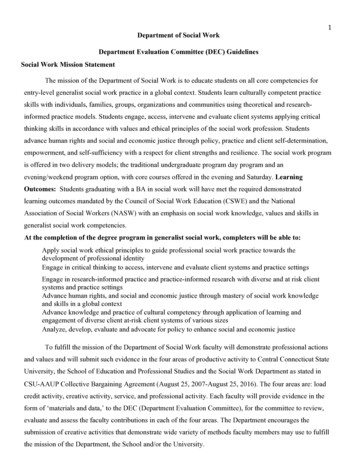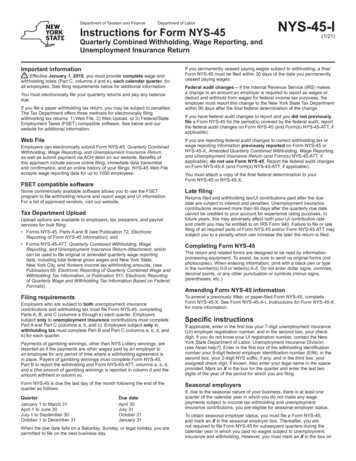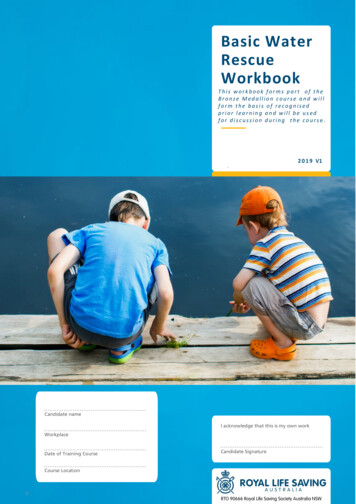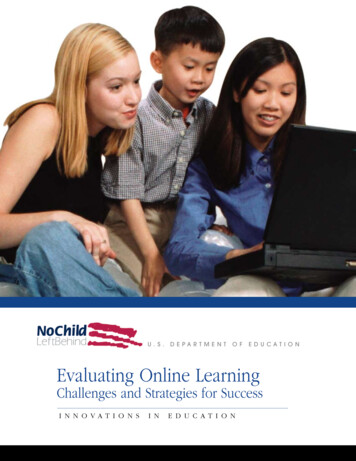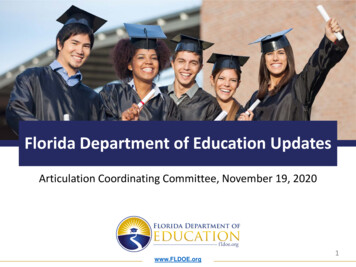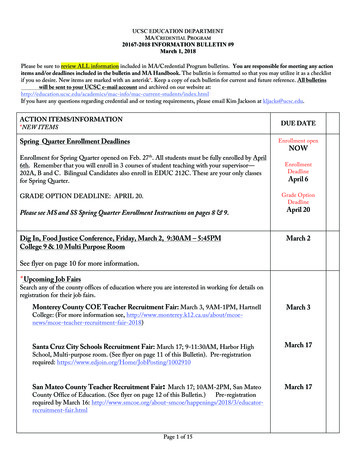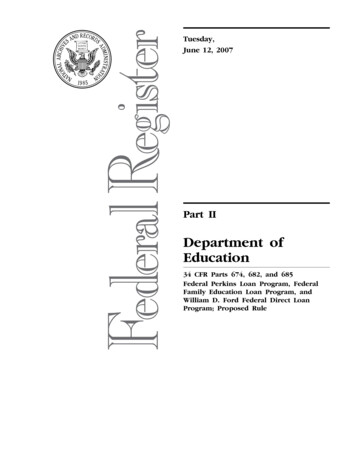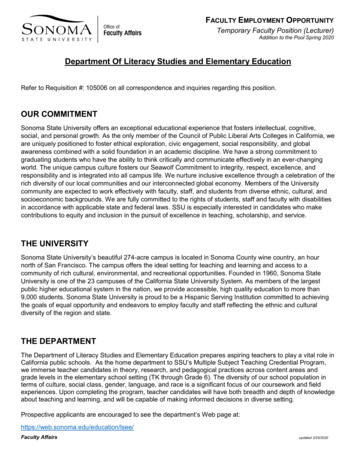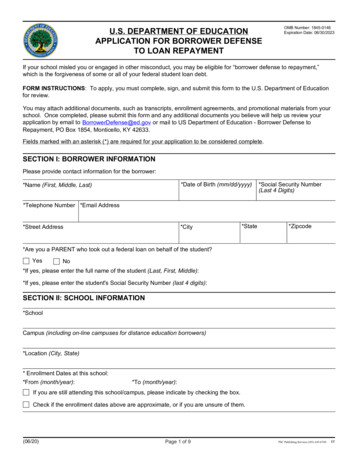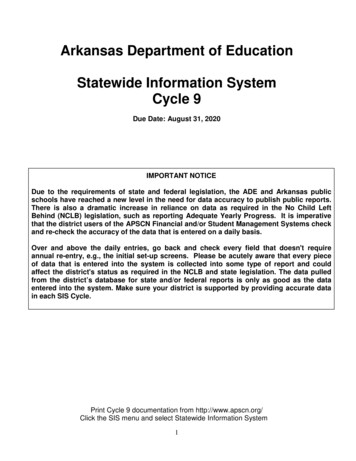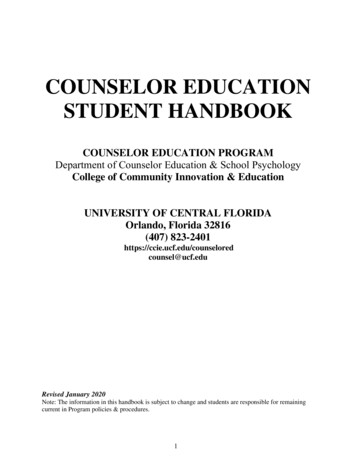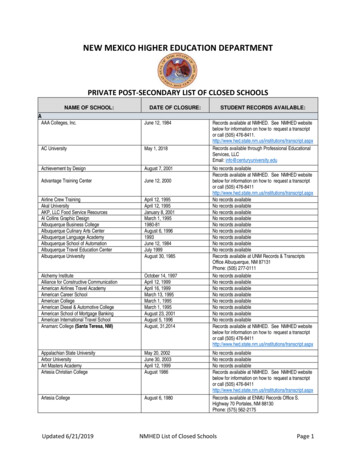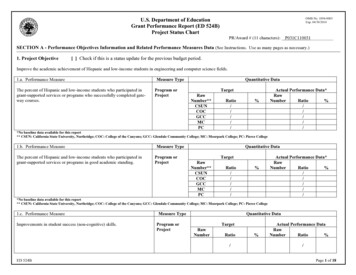
Transcription
OMB No. 1894-0003Exp. 04/30/2014U.S. Department of EducationGrant Performance Report (ED 524B)Project Status ChartPR/Award # (11 characters): P031C110031SECTION A - Performance Objectives Information and Related Performance Measures Data (See Instructions. Use as many pages as necessary.)1. Project Objective[ ] Check if this is a status update for the previous budget period.Improve the academic achievement of Hispanic and low-income students in engineering and computer science fields.1.a. Performance MeasureThe percent of Hispanic and low-income students who participated ingrant-supported services or programs who successfully completed gateway courses.Measure TypeProgram orProjectQuantitative al Performance Data*RawNumberRatio%/////*No baseline data available for this report** CSUN: California State University, Northridge; COC: College of the Canyons; GCC: Glendale Community College; MC: Moorpark College; PC: Pierce College1.b. Performance MeasureThe percent of Hispanic and low-income students who participated ingrant-supported services or programs in good academic standing.Measure TypeProgram orProjectQuantitative al Performance Data*RawNumberRatio%/////*No baseline data available for this report** CSUN: California State University, Northridge; COC: College of the Canyons; GCC: Glendale Community College; MC: Moorpark College; PC: Pierce College1.c. Performance MeasureImprovements in student success (non-cognitive) skills.Measure TypeProgram orProjectQuantitative DataTargetRawNumberRatio/ED 524B%Actual Performance DataRawNumberRatio%/Page 1 of 18
Explanation of Progress (Include Qualitative Data and Data Collection Information)Evaluation Data Sources and Methods for the ObjectiveWe plan to work with CSUN’s Office of Institutional Research and support requests for institutional data at College of the Canyons, Glendale Community College,Pierce College, and Moorpark College to produce the 2016-17 course completion (1a) and academic standing (1b) data for Hispanic and low-income students in engineering and computer science fields. Also, as part of the process, CSUN faculty mentors worked with project staff to identify the gateway courses listed in Table 1.Gateway courses for COC, GCC, PC, and MC are currently under consideration and will be summarized in the next performance report. The gateway courses forCSUN, which are outlined in Table 1, are courses in which transfer students generally enroll in engineering and computer science majors. These courses will also bemonitored with the assistance of CSUN’s Office of Institutional Research.Table 1: Gateway Courses by Institution and MajorInstitutionMajorCSUNMechanical Engineering and Civil EngineeringCSUNElectrical Engineering and Computer EngineeringCSUNManufacturing Systems and Engineering ManagementCSUNComputer ScienceCSUNComputer Information TechnologyGateway CoursesAM 316CE 340ME 370MSE 304ECE 340/LECE 350ECE 320/LMSE 304MSE 304MSE 362MSE 402CE 340COMP 333COMP 322/LCOMP 380/LCIT 270/LCIT 360We also plan to look for improvements in student success skills through the use of results from the Engineering Majors Survey (EMS) – an online survey instrument –and group interviews (i.e., focus groups). Specifically, CSUN plans to collect data on CSUN student interests and career goals surrounding innovation and entrepreneurship through the EMS. With the Engineering Majors Survey (EMS), we will use a pretest/posttest survey administration with CSUN students who participate ingrant-supported services and those who do not participate. Each student participant and comparison group will be surveyed two or more times – once at the projectentry (pretest), at the end of each academic year (posttest), and/or once at project exit (posttest). For the student focus groups, students from CSUN, COC, GCC, PC,and MC will be invited to group interviews in an effort to explore how participation shapes student experiences and outcomes. Focus group participants will be recruited from a pool of students identified by faculty and staff as participants in grant-supported services and programs. A protocol has been developed to ask students toreflect on their experiences in the program and explore changes in their student success skills. The focus groups will be led by the program evaluators, with three to fivefocus groups being conducted in the first, third, and fifth years of the grant period. These focus groups will be audio recorded and have hand-written notes taken duringthe discussion. In addition, focus groups with students who enroll in MATH 150A/L will be invited to participate in a focus group about their changes related to theirstudent success skills.ED 524BPage 2 of 18
Description of Preliminary Findings Related to the ObjectiveNo actual performance measure data are reported here for the objective. Given that project participants have recently been recruited (COC, GCC, MC, and PC) andare currently being recruited, we do not have actual performance measure data to report for the two performance measures (1a and 1b) for this objective. Actual performance data for current project participants will be reported in the next performance report.Description of Project Activities Related to the ObjectiveCurrently, faculty and staff are working to provide program activities and services that will help students successfully complete their gateway courses and maintain goodacademic standing and improve student success. Project activities across all institutions include tutoring, mentoring, textbook award programs, study skills/orientation(CSUN), calculus lab (CSUN), first-time freshman math workshop (CSUN), academic excellence workshops (COC), journal club (COC), workshop on how to develop astudent education plan (GCC), a learning workshop for math (GCC), and team building activities (MC) (please see “Description of Project Activities Related to the Objective” for objective 2 for more details).Plans to Use of Performance Data to Monitor ProgressUsing student participant data, we anticipate that project leads will work with their respective institutional research offices across project sites (CSUN, COC, GCC, MC,and PC) to produce actual course completion and academic standing data from the 2016-17 academic year in August-September 2017.Given that the third performance measure (1c) relates to improvements in student success skills, plans to monitor performance also includes use of results from the EMSonline survey instrument and group interviews (i.e., participant focus groups). Specifically, program evaluators plan to launch the EMS online survey pretest as a pilotto the first group of student participants in Spring or Summer 2017, and data will be collected as part of the group interviews through Fall 2017. Accordingly, groupinterviews will use interview protocols that include multiple items related to improvements in student success (non-cognitive) skills. For example, we included the following questions in the interview protocol:(1) What did you expect CSUN to be like when you first got here?a. Do you feel like you were prepared for a university like CSUN when you first started? What about for your major?(2) Do you think you will succeed in college? Why? What about your major?(3) More broadly, does it feel like you are competing with your peers in AIMS2? Or does it feel like everyone wants each other to succeed? Why or why not?a. Can you describe experiences where you felt validated –culturally, ethnically, linguistically- by your AIMS2 peers?Given that student participants began or will begin in Spring 2017 and the EMS online survey pretest and group interviews will occur during the first project year, weanticipate the reporting of actual performance data on these objectives in the next Annual Performance Report. Specifically, we plan to use institutional data to assessfurther progress on the first and second performance measures (1a and 1b) and the EMS and group interviews to evaluate progress on the third performance measure(1c). Our plans to use data collected through these procedures include discussions of the results in project meetings to address areas of improvement.ED 524BPage 3 of 18
OMB No. 1894-0003Exp. 04/30/2014U.S. Department of EducationGrant Performance Report (ED 524B)Project Status ChartPR/Award # (11 characters): P031C110031SECTION A - Performance Objectives Information and Related Performance Measures Data (See Instructions. Use as many pages as necessary.)2. Project Objective[ ] Check if this is a status update for the previous budget period.Enhance faculty and peer environments for Hispanic and low-income students in engineering and computer science fields.2.a. Performance Measure*The number of Hispanic and low-income students participating in grantfunded student support programs or services.Measure TypeProgram orProjectQuantitative al Performance Data*RawNumberRatio%0/23/10/24/230/*Baseline data (per Instructions for Grant Performance Report)** CSUN: California State University, Northridge; COC: College of the Canyons; GCC: Glendale Community College; MC: Moorpark College; PC: Pierce College2.b. Performance MeasureImprovements in self-reports of quality, quantity, and effects of studentfaculty and peer-peer interaction.Measure TypeProgram orProjectQuantitative DataTargetRawNumberRatio/%Actual Performance Data*RawNumberRatio%/*No baseline data available for this reportExplanation of Progress (Include Qualitative Data and Data Collection Information)Evaluation Data Sources and Methods for the ObjectiveCSUN, College of the Canyons, Glendale Community College, Pierce College, and Moorpark College report their respective data sources and methods pertaining to performance measure 2a below.Evaluation Data Sources and Methods at CSUNCSUN will collect data on student participation through formal recruitment and program acceptance and, on an ongoing basis, through faculty-student individual advising and faculty mentor group meetings with students. See “Description of Project Activities Related to the Objective” for details on faculty mentor group meetings.ED 524BPage 4 of 18
Evaluation Data Sources and Methods at College of the CanyonsCollege of the Canyons collected data on student participation through attendance in student meetings. See “Description of Project Activities Related to the Objective”for details on Student Meetings.Evaluation Data Sources and Methods at Glendale Community CollegeGlendale Community College collected data on student participation through student attendance and participation in biweekly workshop participation. See “Description of Project Activities Related to the Objective” for details on biweekly workshops.Evaluation Data Sources and Methods at Pierce CollegePierce College collected data on student participation through participation in tutoring workshops. See “Description of Project Activities Related to the Objective” fordetails on tutoring workshops.Evaluation Data Sources and Methods at Moorpark CollegeMoorpark College collected data on student participation through student attendance at biweekly meetings. See “Description of Project Activities Related to the Objective” for details on biweekly meetings.Additionally, plans to monitor performance on quality, quantity, and the effects of student-faculty and peer-peer interaction (2b) include use of results from the Engineering Majors Survey (EMS) – an online survey instrument – and group interviews (i.e., focus groups). Specifically, CSUN plans to collect data on student interestsand career goals surrounding innovation and entrepreneurship beginning in Spring or Summer 2017 through an EMS pilot. With the Engineering Majors Survey(EMS), we will use a pretest/posttest survey administration with both CSUN students who participate in grant-supported services and those who do not participate. Eachstudent participant and comparison group will be surveyed two or more times – once at the project entry (pretest), at the end of each academic year (posttest), and/oronce at project exit (posttest). For the student focus groups, students from CSUN, COC, GCC, PC, and MC will be invited to group interviews in an effort to explorehow participation shapes student experiences and outcomes related to student-faculty and peer-peer contact. Focus group participants will be recruited from a pool ofstudents identified by faculty and staff as participants in grant-supported services and programs. A protocol has been developed to ask students to reflect on their experiences in the program. The focus groups will be led by the program evaluators, with three to five focus groups being conducted in the first, third, and fifth years of thegrant period. These focus groups will be audio recorded and have hand-written notes taken during the discussion.Description of Preliminary Findings Related to the ObjectivePreliminary findings for each college are reported below.Preliminary Findings of CSUNCSUN is currently in the recruitment process for first student participant group. Eleven applicants are participating in an interview recruitment process. Upon completion of the interviews, faculty will determine which students will be accepted as student participants.Preliminary Findings of College of the CanyonsData were collected from participation in student meetings. Based on this participation, College of the Canyons reports that 23 students participated in grant-fundedsupport programs or services.Preliminary Findings of Glendale Community CollegeWith the establishment of a new group of student participants, and through tracking of participation in biweekly workshops, Glendale Community College reports that10 students participated in grant-funded support programs.Preliminary Findings of Pierce CollegeWith tutoring available in engineering and calculus-based physics course sections, Pierce College reports that 200 students participated in calculus-based physics sections and 30 students participated through the engineering section. These subtotals yield a total of 230 students served through grant-funded support programs.ED 524BPage 5 of 18
Preliminary Findings of Moorpark CollegeThrough student project participation in biweekly meetings, Moorpark College reports that 24 students participated in grant-funded support programs or services.Description of Project Activities Related to the ObjectiveSpecific project activities at CSUN, College of the Canyons, Glendale Community College, Pierce College, and Moorpark College, respectively, are detailed below.Project Activities at CSUNAlthough CSUN is in the final stages of forming the first group of student participants for the Spring 2017 term, faculty and staff have worked to implement multipleprogram activities to support this student participant group and future student participants. These programs include establishing a peer-tutoring component to theprogram. In particular, in January-February 2017, we recruited and hired peer tutors from CSUN’s upper-division undergraduate and graduate students in the College of Engineering and Computer Science. In addition to peer tutoring, faculty mentors will be assigned to each student participant, and these faculty mentors haveplanned small group meetings with student participants. These meetings support student-faculty interaction and student development, and are also intended to facilitatepeer-peer interaction. Additionally, faculty mentors will meet with students on a regular basis one-on-one to discuss their academic performance and help them withadvising. Further, project faculty developed and enrolled students in a designated course section of MATH 105A/L that offers students enhanced instruction, includinga teaching assistant for the lab component of the course.Project faculty and staff at CSUN are planning a study skills/orientation and specialized math workshops. CSUN faculty are working to create a study skills/orientationworkshop to begin Summer 2017 designed as a week-long program during CSUN’s summer orientation and will provide customized workshops to help first time freshman (FTF) entering the College of Engineering and Computer Science. The topics covered in the customized workshops include a welcome to engineering, concernsabout being an engineer, setting student goals in engineering, what is a study plan, preparing for class, learning strategies, managing your finances, and a tour of theengineering labs, etc. As a complimentary summer program, CSUN faculty are working to create a math workshop for first time freshman (FTF) to also begin Summer2017. The goal is to support and accelerate students’ progress through the math course sequence. Utilizing the Math Selection Assessment (MSA) online system andweekly face-to-face tutoring support, students will participate in a four-to-six week workshop over the summer in preparation of the Math Placement Test (MPT). TheMPT is used to determine eligibility to enroll in specific math courses and is required for all incoming freshmen. Through adequate preparation for the MPT, studentswill be better prepared with the likelihood of testing to their full capability. This approach has the potential to improve student retention and ultimately graduationrates. In addition, CSUN faculty have also worked to create a calculus lab which enhances the materials and instruction for one section of a Calculus 150A lab. Calculus 150A is a math prerequisite course for all majors in the College of Engineering and Computer Science. Students meet weekly with faculty and a teaching assistant(TA) to review the lesson for the week and are provided with additional examples and hands on technology (Geogebra). Geogebra is mathematics software that bringstogether geometry, spreadsheets, graphing, statistics, and calculus, and is set-up for the TA to use during class as a demo and for students to use both during and outsideof class.Project Activities at College of the CanyonsProject activities at College of the Canyons include a journal club, in which students will meet with a professional scientist/engineer from NASA Armstrong and will discuss current scientific and technological articles. COC will also host monthly student meetings where students will have the opportunity to learn more about study skills,internship opportunities, scholarship opportunities, current trends in research, and future workshops, with a format open to questions and discussions with peers.There will also be an offering of weekly Academic Excellence Workshops where students will develop and refine study and test taking skills for academic success in theircurrent STEM courses under the guidance of a trained facilitator. Workshops will primarily be offered in calculus and chemistry. In addition to these ongoing meetingsand workshops, students are also invited to attend special lectures exposing students to how our global economy will affect our future in the STEM field, and how various STEM majors fit into civic engagement through discussion with peers and faculty. College of the Canyons will also sponsor students to attend the Society of HispanicProfessional Engineers (SHPE) Regional Conference. This conference fosters an environment to accelerate and enhance leadership, management, and technical skills.Project Activities at Glendale Community CollegeDuring the course of this project period, students at Glendale Community College will be supplemented with workshops that cover many topics relevant to student success. These topics include a welcome orientation to help students create a sense of community, time dedicated to developing a student education plan that includes transfer options, an introduction to the career center that explains how to prepare a resume and what to expect at a conference, and a math workshop. In addition, studentsare given the task of working with other ca
academic standing and improve student success. Project activities across all institutions include tutoring, mentoring, textbook award programs, study skills/orientation (CSUN), calculus lab (CSUN), first-time freshman math workshop (CSUN), academic excellence workshop
